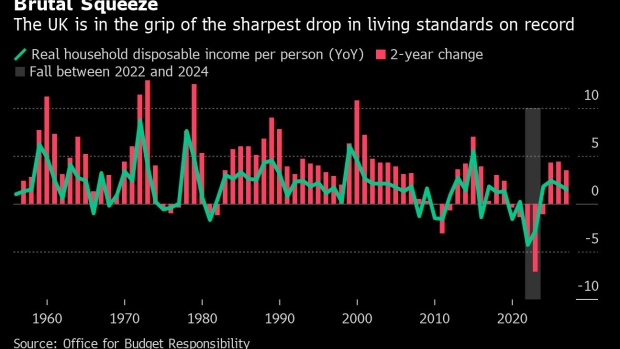Nov 20, 2022
Your Sunday UK Briefing: Big Brands, Harry Kane and the World Cup
, Bloomberg News

(Bloomberg) --
Hello again.
Well, if you need a break from post-Autumn Statement fretting, you’ve got four weeks of potential distraction with the start of the World Cup today. So, grab a pint or a pinot (as long as you’re not watching from a stadium in Qatar) and belt out It’s Coming Home, which it won’t be of course. Here’s the new version, complete with Lionesses and Sir Geoff Hurst, just in time for kickoff. Wales fans should stick to Hen Wlad Fy Nhadau.
The big game: The Three Lions start their latest bid to end 56 years of World Cup hurt against Iran on Monday, before a potentially key match against Team USA on Friday, when the Americans may still be suffering from a food coma after Thursday’s Thanksgiving excitement. The big one could be against Gareth Bales et al the following week. For all the handwringing over the tournament being held in Qatar, the World Cup could still attract 5 billion viewers. And when there’s that big an audience, as Simone Foxman and Alex Webb report, big brands will pay big to reach them.
The big deal: The COP27 climate talks in Egypt, which had appeared close to collapse, ended in overtime on Sunday with a deal to create a fund to pay poorer countries for the harm caused by climate change. It marked a landmark moment in global climate politics -- an acknowledgment that richer nations are responsible to the developing world for the harm caused by rising temperatures, but the conference did little to advance the ambitions of last year’s COP in Glasgow to rein in harmful greenhouse gas emissions.
The big market thought: Investors are slowly coming to terms with the sheer size of the government’s borrowing needs over the next few years and it doesn’t look pretty, Alice Gledhill reports. As one rates strategists notes: It’s hard to see an environment where the usual buyers of gilts will step up.
The big money: There’s long been a clamor for a wealth tax. But with inflation likely to running at close to 10% this year and in high single digits next year, the country already has one. And as Merryn Somerset Webb reports, Jeremy Hunt’s budget plan limited the tools available to shield yourself from inflation’s corrosive effects.
The big data: On Tuesday, we get the latest Economic Outlook report by the Organisation for Economic Co-operation and Development, which warned in September of looming recessions and worsening prospects because of the war in Ukraine. Manufacturing confidence numbers come on Tuesday, followed by similar PMI data for the euro region on Thursday. The reports may provide new evidence about how far the UK economy is lagging behind its industrialized peers.
The big opinion: Rishi Sunak may have won the respect of the markets for his fiscal conservatism, but he’s struggling with voters, Martin Ivens writes. And while that may give the Labour Party more even reason to cheer, Keir Starmer & co. should take note that the path back to power will be paved by penury.
ICYM our Big Take: Guyana’s government is betting on a paradox. As rising sea levels imperil the South American country, it has stumbled upon a crude oil jackpot not far from its shoreline. The country’s leaders now believe the most effective way to rescue Guyana from fossil-fuel-induced climate change is to fully embrace the business of fossil fuels.
Now hear this: And in another area where the UK is lagging behind, London is no longer home to Europe's biggest stock market. Before the 2016 Brexit vote, British stocks were collectively worth $1.5 trillion more than those of France. Last week, the French stock market achieved a valuation of $2.823 trillion, narrowly edging out the UK. Tune in to our In the City podcast, where David Merritt speaks to reporter Joe Easton, who has been closely monitoring the race for months.
On that note, have a good week. See you on the other side.
©2022 Bloomberg L.P.


